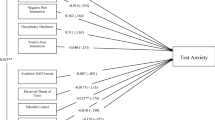Abstract
This study aimed to investigate the importance of different sources of perceived social support, sociotropic and autonomic personality dispositions, achievement expectation, and importance of academic achievement in predicting anxiety symptoms of male and female students who were preparing for the university entrance exam. Three hundred and forty students with ages varying from 16 to 21 participated in the study. Separate multiple regression analyses were run for males and females in predicting anxiety symptoms. The total Sociotropy score and the total Social Support score predicted anxiety for females, whereas for males, anxiety was predicted by four variables, namely, Achievement Expectancy, Concern over Approval, Social Support from Family, and Social Support from Friends. Implications of these results were discussed.
Similar content being viewed by others
References
Aro, H., Hanninen, V., & Paronen, O. (1989). Social support, life events, and psychosomatic symptoms among 14- to 16-year-old adolescents.Social Science and Medicine, 29 (9), 1051—1056.
Beck, A.T. (1983). Cognitive models of depression: New Perspectives. In P. J. Clayton & J. E. Barrett (Eds.),Treatment of Depression: Old Controversies and New Approaches (pp.265–290). New York: Raven Press.
Beck, A.T., Emery, G., & Greenberg, R.L. (1985).Anxiety Disorders and Phobias: A Cognitive Approach. New York: Basic Books.
Beck, A.T., Epstein, N., Harrison, R.P., & Emery, G. (1983). Development of the Sociotropy-Autonomy Scale: A Measure of personality factors in psychopathology. Philadelphia, PA: Center for Cognitive Therapy, University of Pennsylvania Medical School.
Bell, R.A., Leroy, J.B., & Stephen, J.J. (1982). Evaluating the mediating effects of social support upon life events and depressive symptoms.Journal of Community Psychology, 74_(4), 413–445.
Cattell, R.B. (1966). The scree test for the number of factors.Multivariate Behavioral Research, 1, 245–276.
Cohen, S., & Wills, T.A. (1985). Stress, social support, and the buffering hypothesis.Psychological Bulletin, 98 (2), 310–357.
Cohen, L.H., Towbes, L.C., & Flocco, R. (1988). Effects of induced mood on self-reported life events and perceived and received social support.Journal of Personality and Social Psychology, 55 (4), 669–674.
Compas, B.E. (1987). Stress and life events during childhood and adolescence.Clinical Psychology Review, 7, 275–302.
Compas, B.E., Howell, P.C., Phares, V., Williams, R.A., & Giunta, C.T. (1989). Risk factors for emotional/behavioral problems in young adolescents: A prospective analysis of adolescent and parental stress and symptoms.Journal of Consulting and Clinical Psychology, 57, 732–740.
Cutrona, C. (1990). Stress and social support: In search of optimal matching.Journal of Social and Clinical Psychology, 9 (1), 3–14.
Cutrona, C.E., Cole, V., Colangelo, N., Assouline, S., & Russell, D.W. (1994). Perceived parental social support and academic achievement: An attachment theory perspective.Journal of Personality and Social Psychology, 66 (2), 369–378.
Dean, A., & Lin, N. (1977). The stress buffering role for social support.Journal of Nervous and Mental Disease, 164 (6), 403–414.
DeVito, A., & Kubis, J. (1983). Actual and recalled test anxiety and flexibility, rigidity, and self-control.Journal of Clinical Psychology, 39, 970–975.
DuBois, D.L., Feiner, R.D., Brand, S., Adan, A.M., & Evans, E.G. (1992). A prospective study of life stress, social support, and adaptation in early adolescence.Child Development, 63, 542–557.
Dubow, E.F., & Tisak, J. (1989). The relation between stressful life events and adjustment in elementary school children: The role of social support and social problem-solving skills.Child Development, 60, 1412–1423.
Eker, D., & Arkar, H. (1995). Perceived social support: Psychometric properties of the MSPSS in normal and pathological groups in a developing country.Social Psychiatry and Psychiatric Epidemiology, 30, 121–126.
Furst, D., Tenenbaum, G., & Weingarten, G. (1985). Test anxiety, gender and exam type.Psychological Reports, 56, 663–668.
Gilbert, P., & Reynolds, S. (1990). The relationship between the Eysenck Personality Questionnaire and Beck's concept of sociotropy and autonomy.‘BritishJournal of Psychology,’29, 319–325.
Gottlieb, B.H. (1980, May).Social networks and social support in the design of preventive interventions. Paper presented at a symposium on Helping Networks and the Welfare State, University of Toronto, Ontario.
Hammen, C, Ellicott, A., Gitlin, M., & Jamison, K.R. (1989). Sociotropy/Autonomy and vulnerability to specific life events in patients with unipolar depression and bipolar disorders.Journal of Abnormal Psychology, 98, 154–160.
Kessler, R.C., Price, R.H., & Wortman, C.B. (1985). Social factors in psychopathology: Stress, social support and coping processes.Annual Review of Psychology, 36, 531–572.
LeCompte, A., & öner, N. (1976). Development of the Turkish edition of the state-trait anxiety inventory. In C.D. Spielberger, & D. Guerrero, (Eds.), Cross Cultural Anxiety (pp. 51–68). Washington D.C.: Hemisphere Publishing Corporation.
Oner, N. (1977). Durumluk-Sürekli Kayg” Envanteri'nin Türk toplumunda geçerlgi [Validity of State-Trait Anxiety Inventory in Turkish Culture]. Unpublished doctoral dissertation. Hacettepe University, Ankara.
Öner, N., & LeCompte, A. (1985).Durumluk-Siirekli Kayg“ Envanteri el kitab” [Handbook of Turkish version of State-Trait Anxiety Inventory]. Istanbul: Bogaziçi University.
Robins, C.J., Block, P., & Peselow, E.D. (1989). Relations of sociotropic and autonomous personality characteristics of specific symptoms in depressed patients. Journal of Abnormal Psychology, 98, 86–88.
Rowlison, R.T., & Feiner, R.D. (1988). Major life events, hassles, and adaptation in adolescence: Confounding in the conceptualization and measurement of life stress and adjustment revisited.Journal of Personality and Social Psychology, 55, 432–444.
Sahin, N., Ulusoy, M., & Sahin, N. (1993). Exploring the sociotropy-autonomy dimensions in a sample of Turkish psychiatric inpatients.Journal of Clinical Psychology, 49 (6), 751–763.
Sarason, S.B., Lighthall, F.F., Davidson, K.S., Waite, R.R., & Ruebush, B.K. (1960).Anxiety in elementary school children. New York: John Wiley.
Spielberger, C.D., Gorsuch, R.L., & Lushene, R.E. (1970).Manual for the State-Trait Anxiety Inventory. Palo Alto, CA: Consulting Psychologists Press.
Thoits, P.A. (1986). Social support as coping assistance.Journal of Consulting and Clinical Psychology, 54 (4), 416–423.
Wilcox, B. (1981). Social support, life stress, and psychological adjustment: A test of the buffering hypothesis.American Journal Community Psychology, 9 (4), 371–386.
Zimet, G.D., Dahlem, N.W., Zimet, S., & Farley, G.K. (1988). The MultidimensionalScale of Perceived Social Support.Journal of Personality Assessment, 52, 30–41.
Author information
Authors and Affiliations
Corresponding author
Additional information
This study was supported by the Turkish Academy of Sciences under the Young Scientist Award Program. (TG-TUBA-GEB>P/2002-l-ll).
Rights and permissions
About this article
Cite this article
Koçkar, A.I., Gençöz, T. Personality, social support, and anxiety among adolescents preparing for university entrance examinations in turkey. Curr Psychol 23, 138–146 (2004). https://doi.org/10.1007/BF02903074
Accepted:
Issue Date:
DOI: https://doi.org/10.1007/BF02903074




